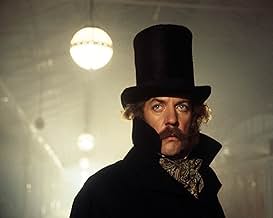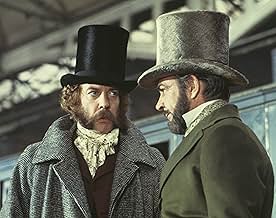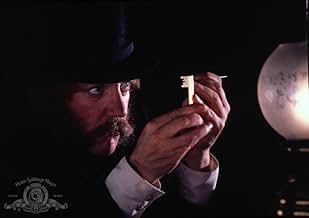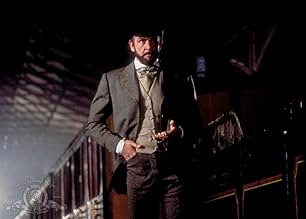Inglaterra, década de 1850. Un criminal experto pretende robar una gran suma de oro de un tren. La seguridad es increíblemente buena y la tarea parece imposible. Sin embargo, tiene un plan y... Leer todoInglaterra, década de 1850. Un criminal experto pretende robar una gran suma de oro de un tren. La seguridad es increíblemente buena y la tarea parece imposible. Sin embargo, tiene un plan y las personas adecuadas para llevarlo a cabo.Inglaterra, década de 1850. Un criminal experto pretende robar una gran suma de oro de un tren. La seguridad es increíblemente buena y la tarea parece imposible. Sin embargo, tiene un plan y las personas adecuadas para llevarlo a cabo.
- Premios
- 1 premio y 1 nominación en total
- John - Trent's Butler
- (as Brian De Salvo)
- Judge
- (as Andre Morell)
Argumento
¿Sabías que...?
- CuriosidadesWriter and director Michael Crichton based his book and movie, only loosely on the actual crime committed in 1855. In real-life, there were four criminals: Pierce, Agar, the railway guard Burgess, and a railway clerk named Tester. All four keys were kept on railway premises, two in London, and two in Folkestone. They were stolen temporarily by Tester and Pierce, respectively, so that Agar could duplicate them, but it turned out that the Folkestone keys were not being used anyway. The guard's van was not locked from the outside; Pierce and Agar were let in by Burgess, and a share of the loot was handed out to Tester, at stations. None of the criminals were spotted at once; it was several months before the railway conceded that the crime must have occurred on the train. The details came to light after Agar had been convicted in an unrelated crime, and his accomplices decided to steal his share instead of using it, as he had asked, to provide his mistress an income. She got word to him, and he turned Queen's Evidence against the others, and told all. At no point in the case, did anyone escape from custody.
- PifiasIf the gold shipment was solely to pay British soldiers in Crimea, as asserted, it would have been in the form of barrels of gold coins, not gold bars as shown.
- Citas
Judge: [Judgementally] Now, on the matter of motive, we ask you: Why did you conceive, plan and execute this dastardly and scandalous crime?
Edward Pierce: I wanted the money.
[the court spectators roar with laughter]
- Créditos adicionalesCóras Iompair Éireann is misspelled in the end titles with an accent over the 'C' instead of the 'o'.
- Versiones alternativasUnder the terms of the Cinematograph Films (Animals) Act 1937 all UK versions of the film are cut by 32 secs with edits to a scene where a dog hunts and kills rats in a show arena ('ratting').
- Banda sonoraI Dreamt I Dwelt in Marble Halls
(uncredited)
Music by Michael William Balfe
Lyrics by Alfred Bunn (1843)
Heard on violin offstage in bordello
Sean Connery's character has decided for himself that he will pull off what no other thief has even properly attempted to do, namely steal a large amount of government gold from a massively secured safe on a moving train. He receives help from the lewd Lesley-Ann Down, who merely just uses her feminine charms and bodily trumps, and the self-acclaimed fastest key runner in the country; Donald Sutherland. Together they must figure out how to unnoticedly get hold of four separately secured keys to the safe, and then still find a solution to break into the guarded bank wagon and get out the loot. "The Great Train Robbery" reminded me very much of "Ocean's 11". I haven't seen the 1960 original, starring Frank Sinatra, but it isn't unthinkable that Steven Soderbergh also took some ideas from this film whilst he was preparing the 2001 remake. Connery's witty charms and small talks to infiltrate into high-society families, the grotesquely detailed schemes to plagiarize the keys, the acrobatic con-artist, the meticulously timed simulations, ... These are all scenes that could come straight out of "Ocean's 11".
"The Great Train Robbery" is a well-made, nicely acted and overall reasonably entertaining period film. It does have several defaults, though, notably that Crichton cannot seem to decide whether he wants his film to be a comical crime caper or a suspenseful heist movie. Certain parts are particularly bleak (like the dog-fighting, the execution, etc...) but mostly it's tongue-in-cheek, so the film kind falls in between genres. The Robin Hood styled ending also feels very forced. The Victorian costumes and decors look great, Jerry Goldsmith's score is exhilarating and both Sean Connery and Donald Sutherland put down pleasant performances, all of which still makes "The Great Train Robbery" recommended viewing!
- Coventry
- 27 feb 2019
- Enlace permanente
Selecciones populares
Detalles
- Fecha de lanzamiento
- País de origen
- Idiomas
- Títulos en diferentes países
- El gran assalt al tren
- Localizaciones del rodaje
- Cork Kent station, Glanmire Road, Cork, County Cork, Irlanda(Brighton station)
- Empresas productoras
- Ver más compañías en los créditos en IMDbPro
Taquilla
- Presupuesto
- 6.000.000 US$ (estimación)
- Recaudación en Estados Unidos y Canadá
- 13.027.857 US$
- Fin de semana de estreno en EE. UU. y Canadá
- 391.942 US$
- 4 feb 1979
- Recaudación en todo el mundo
- 13.027.857 US$
- Duración1 hora 50 minutos
- Color
- Relación de aspecto
- 1.85 : 1
Contribuir a esta página























